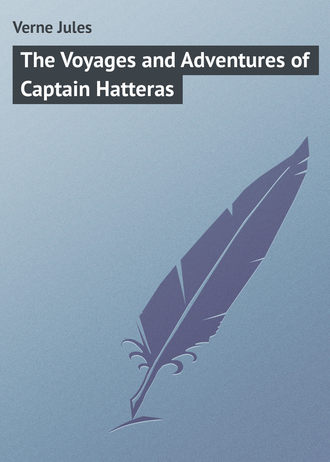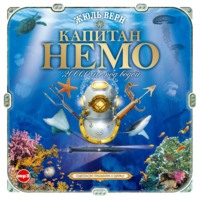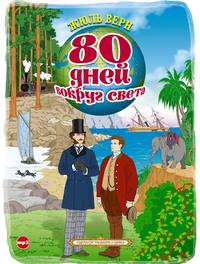 полная версия
полная версияThe Voyages and Adventures of Captain Hatteras
"In fact, these regions have been explored for fifteen years, and until certain proof of Franklin's death was received, the Admiralty always kept five or six ships cruising in these waters. If I'm not mistaken, Griffith Island, which I see in the middle of the open space, has become a general rendezvous for explorers."
"True, Doctor, and Franklin's ill-fated expedition has been the means of our learning so much about these parts."
"Exactly; for there have been a great many expeditions since 1845. It was not till 1848 that there was any alarm about the continued non-appearance of the Erebus and the Terror, Franklin's two ships. Then the admiral's old friend, Dr. Richardson, seventy years of age, went through Canada, and descended Coppermine River to the Polar Sea; on the other side, James Ross, in command of the Enterprise and the Investigator, sailed from Upernavik in 1848, and reached Cape York, where we are now. Every day he threw overboard a cask containing papers telling where he was; during fogs he fired cannon; at night he burned signal-fires and sent off rockets, carrying always but little sail; finally, he wintered at Leopold's Harbor in 1848-49; there he caught a large number of white foxes; he had put on their necks copper collars on which was engraved a statement of the position of the ship and where supplies had been left, and he drove them away in every direction; then, in the spring, he explored the coast of North Somerset on sledges, amid dangers and privations which disabled nearly all his men. He built cairns, enclosing copper cylinders with instructions to the absent expedition; during his absence, Lieutenant MacClure explored fruitlessly the northern coast of Barrow Strait. It is noteworthy, Captain, that James Ross had among his officers two men who afterwards became celebrated, – MacClure, who found the Northwest Passage, and MacClintock, who found the last remains of the Franklin expedition."
"Two good and brave captains, two brave Englishmen; go on, Doctor, with this account which you know so well; there is always something to be learned from the account of bold adventurers."
"Well, to conclude with James Ross, I have only to add that he tried to go farther west from Melville Island; but he nearly lost his ships, and being caught in the ice he was carried, against his will, to Baffin's Bay."
"Carried," said Hatteras, frowning, – "carried against his will!"
"He had discovered nothing," resumed the doctor; "it was only after 1850 that English ships were always exploring there, when a reward of twenty thousand pounds was offered to any one who should discover the crews of the Erebus and Terror. Already, in 1848, Captains Kellet and Moore, in command of the Herald and the Plover, tried to make their way through by Behring Strait. I ought to say that the winter of 1850-51, Captain Austin passed at Cornwallis Island; Captain Penny, with the Assistance and Resolute, explored Wellington Channel; old John Ross, who discovered the magnetic pole, started in his yacht, the Felix, in search of his friend; the brig Prince Albert made her first voyage at the expense of Lady Franklin; and, finally, two American ships, sent out by Grinnell, under Captain Haven, carried beyond Wellington Channel, were cast into Lancaster Sound. It was during this year that MacClintock, Austin's lieutenant, pushed on to Melville Island and to Cape Dundas, the extreme points reached by Parry in 1819, and on Beechey Island were found traces of Franklin's wintering there in 1845."
"Yes," answered Hatteras, "three of his sailors were buried there, three fortunate men!"
"From 1851 to 1852," continued the doctor, with a gesture of agreement, "we find the Prince Albert making a second attempt with the French lieutenant, Bellot; he winters at Batty Bay in Prince Regent's Sound, explores the southwest of Somerset, and reconnoitres the coast as far as Cape Walker. Meanwhile, the Enterprise and Investigator, having returned to England, came under the command of Collinson and MacClure, and they rejoined Kellet and Moore at Behring Strait; while Collinson returned to winter at Hong-Kong, MacClure went on, and after three winters, 1850-51, 1851-52, and 1852-53, he discovered the Northwest Passage without finding any traces of Franklin. From 1852 to 1853, a new expedition, consisting of three sailing-vessels, the Assistance, the Resolute, the North Star, and two steam-vessels, the Pioneer and the Intrepid, started out under the orders of Sir Edward Belcher, with Captain Kellet second in command; Sir Edward visited Wellington Channel, wintered in Northumberland Bay, and explored the coast, while Kellet, pushing on as far as Brideport on Melville Island, explored that region without success. But then it was rumored in England that two ships, abandoned in the ice, had been seen not far from New Caledonia. At once Lady Franklin fitted out the little screw-steamer Isabella, and Captain Inglefield, after ascending Baffin's Bay to Victoria Point, at the eightieth parallel, returned to Beechey Island with equal unsuccess. At the beginning of 1855 the American Grinnell defrays the expense of a new expedition, and Dr. Kane, trying to reach the Pole – "
"But he did not succeed," cried Hatteras with violence, "and thank God he did not! What he did not do, we shall!"
"I know it, Captain," answered the doctor, "and I only speak of it on account of its connection with the search for Franklin. Besides, it accomplished nothing. I nearly forgot to say that the Admiralty, regarding Beechey Island as a general rendezvous, ordered the steamer Phoenix, Captain Inglefield, in 1853, to carry provisions there; he sailed with Lieutenant Bellot, who for the second, and last, time offered his services to England; we can get full details about the catastrophe, for Johnson, our boatswain, was eye-witness of this sad affair."
"Lieutenant Bellot was a brave Frenchman," said Hatteras, "and his memory is honored in England."
"Then," resumed the doctor, "the ships of Belcher's squadron began to return one by one; not all, for Sir Edward had to abandon the Assistance in 1854, as McClure had the Investigator in 1853. Meanwhile Dr. Rae, in a letter dated July 29, 1854, written from Repulse Bay, gave information that the Esquimaux of King William's Land had in their possession different objects belonging to the Erebus and Terror; then there was no doubt possible about the fate of the expedition; the Phoenix, the North Star, and the ship of Collinson returned to England; there was then no English ship in these waters. But if the government seemed to have lost all hope, Lady Franklin did not despair, and with what was left of her fortune she fitted out the Fox, commanded by MacClintock; he set sail in 1857, wintered about where you made yourself known to us, Captain; he came to Beechey Island, August 11, 1858; the next winter he passed at Bellot Sound; in February, 1859, he began his explorations anew; on the 6th of May he found the document which left no further doubt as to the fate of the Erebus and Terror, and returned to England at the end of the same year. That is a complete account of all that has been done in these regions during the last fifteen years; and since the return of the Fox, no ship has ventured among these dangerous waters!"
"Well, we shall try it!" said Hatteras.
CHAPTER XV
THE FORWARD DRIVEN SOUTHWARD
Towards evening the weather cleared up, and land was clearly to be seen between Cape Sepping and Cape Clarence, which juts out to the east, then to the south, and is connected to the mainland on the west by a low tongue of land. There was no ice at the entrance of Regent's Sound; but it was densely massed beyond Leopold Harbor, as if to form an impassable barrier to the northward progress of the Forward.
Hatteras, who, although he carefully concealed his feelings, was exceedingly annoyed, had to blow out a way with powder in order to enter Leopold Harbor; he reached it at midday, on Sunday, May 27th; the brig was securely anchored to the large icebergs, which were as firm, solid, and hard as rock.
At once the captain, followed by the doctor, Johnson, and his dog Duke, leaped out upon the ice and soon reached the land. Duke leaped about with joy; besides, since the captain had made himself known, he had become very sociable and very gentle, preserving his ill-temper for some of the crew, whom his master disliked as much as he did.
The harbor was free from the ice which is generally forced there by the east-wind; the sharp peaks, covered with snow, looked like a number of white waves. The house and lantern, built by James Ross, were still in a tolerable state of preservation; but the provisions appeared to have been eaten by foxes, and even by bears, of which fresh traces were to be seen; part of the devastation was probably due to the hand of man, for some ruins of Esquimaux huts were to be seen on the shores of the bay.
The six tombs, enclosing six sailors of the Enterprise and the Investigator, were recognizable by little mounds of earth; they had been respected by all, by both men and beasts.
On first setting his foot on this northern earth, the doctor was really agitated; it would not be easy to describe the emotions one feels at the sight of these ruined houses, tents, huts, supplies, which nature preserves so perfectly in cold countries.
"There," said he to his companions, – "there is the spot which James Ross himself named Camp Refuge! If Franklin's expedition had reached this spot, it would have been saved. Here is the engine which was taken out and left here, and the furnace which warmed the crew of the Prince Albert in 1851; everything remains as it was left, and one might fancy that Kennedy, her captain, had sailed away from here yesterday. This is the launch that sheltered them for some days, for Kennedy was separated from his ship, and only saved by Lieutenant Bellot, who braved the cold of October to join him."
"A brave and excellent officer he was," said Johnson. "I knew him."
While the doctor eagerly sought for traces of previous winterings there, Hatteras busied himself with collecting the scanty fragments of fuel and provisions which lay there. The next day was devoted to carrying them on board ship. The doctor explored the whole neighborhood, never going too far from the brig, and sketched the most remarkable views. The weather gradually grew milder; the snow-drifts began to melt. The doctor made a tolerably large collection of northern birds, such as gulls, divers, molly-nochtes, and eider-ducks, which resemble ordinary ducks, with a white back and breast, a blue belly, the top of the head blue, the rest of the plumage white, shaded with different tints of green; many of them had already plucked from their bellies the eider-down, which both the male and the female devote to lining their nests. The doctor also saw great seals breathing at the surface of the water, but he was unable to draw one.
In his wanderings he discovered the stone on which is engraved the following inscription: —
[E I]1849,which marks the passage of the Enterprise and Investigator; he pushed on to Cape Clarence, to the spot where, in 1833, John and James Ross waited so impatiently for the ice to thaw. The earth was covered with the skulls and bones of animals, and traces of the dwellings of Esquimaux were to be seen.
The doctor thought of erecting a cairn at Leopold Harbor, and of leaving a letter there to indicate the passage of the Forward and the aim of the expedition. But Hatteras formally objected; he did not wish to leave behind him any traces which might be of use to a rival. In spite of all he could say, the doctor was obliged to yield to the captain's will. Shandon was ready enough to blame this obstinacy, for, in case of accident, no ship could have put out to the aid of the Forward.
Hatteras refused to comply. Having completed his preparations on Monday, he tried once more to go to the north through the ice, but, after dangerous efforts, he was obliged to descend again Regent's Channel; he was utterly averse to remaining at Leopold's Harbor, which is open one day and closed the next by the unheralded motion of the ice, – a frequent phenomenon in these seas, and one against which navigators have to be ever on their guard.
If Hatteras kept his anxiety from the others, he was at heart very anxious; he wanted to go northward, and he was obliged to retreat to the south! Where would that bring him? Was he going as far back as Victoria Harbor in the Gulf of Boothia, where Sir John Ross wintered in 1833? Should he find Bellot Sound free at this time, and, by going around North Somerset, could he ascend through Peel Sound? Or should he, like his predecessors, be caught for many winters, and be obliged to consume all his supplies and provisions?
These fears tormented him; but he had to decide; he put about and started for the south.
Prince Regent's Channel is of nearly uniform width from Leopold's Harbor to Adelaide Bay. The Forward went rapidly through the ice, with better fortune than many other ships, most of which required a month to descend the channel, even in a better season; it is true that none of these ships, except the Fox, had steam at their command, and were obliged to do their best against frequent unfavorable winds.
The crew seemed overjoyed at leaving the northern regions; they had but a slight desire to reach the Pole; they were alarmed at Hatteras's plans, for his reputation as a fearless man inspired them with but little confidence. Hatteras tried to make use of every opportunity to go forward, whatever the consequences might be. And yet in these parts, to advance is all very well, but one must also maintain his position and not run the risk of losing it.
The Forward went on under full steam; the black smoke whirled in spirals about the sparkling summits of the icebergs; the weather was changeable, turning from a dry cold to a snowstorm with inconceivable rapidity. Since the brig drew but little water, Hatteras hugged the west shore; he did not want to miss the entrance of Bellot Sound, for the Gulf of Boothia has no other entrance towards the south than the slightly known sound of the Fury and the Hecla; hence the gulf would be impassable, if Bellot Sound were missed or found impracticable.
By evening the Forward was in sight of Elwin Bay, which was recognized by its high, steep cliffs; Tuesday morning Batty Bay was seen, where, on the 10th of September, 1851, the Prince Albert anchored for the winter. The doctor examined the coast with interest through his glass. From this point started the expeditions which determined the shape of North Somerset. The weather was clear enough for them to see the deep ravines surrounding the bay.
The doctor and Johnson were probably the only ones who took any interest in these deserted countries. Hatteras, always studying his charts, talked little; his silence increased as the ship drew southward; he often went upon the quarter-deck, and there he would remain for hours, with folded arms, gazing absently at the horizon. His orders, when he gave any, were short and quick. Shandon maintained a cold silence, and drawing more and more into himself, he had nothing more to do with Hatteras than was officially required; James Wall remained devoted to Shandon, and modelled his conduct after that of his friend. The rest of the crew waited for whatever might turn up, ready to make the best use of it for their own profit. On board there was none of the unanimity which is so necessary for the accomplishment of great things. Hatteras knew this well.
During the day two whalers16 were seen making toward the south; a white bear, too, was saluted with a few rifle-shots, but apparently without success. The captain knew the worth of an hour at that time, and refused permission to chase the animal.
Wednesday morning the end of Regent Channel was passed; the angle of the west coast was followed by a deep curve in the land. On examining his chart, the doctor recognized Somerset-House Point, or Point Fury.
"There," he said to his usual companion, – "there is where the first English ship was lost that was sent to these seas in 1815, in Parry's third voyage; the Fury was so much injured by the ice in her second winter, that the crew were obliged to abandon her and to return to England in her companion, the Hecla."
"A good reason for having another ship," answered Johnson; "that is a precaution which polar explorers should not neglect; but Captain Hatteras was not the man to burden himself with a companion!"
"Do you consider him rash, Johnson?" asked the doctor.
"I? O, I don't say anything of the sort, Dr. Clawbonny! But see those piles there, with fragments of a tent hanging to them."
"Yes, Johnson, it is there Parry unloaded all his ship's supplies, and, if my memory serves me right, the roof of the hut he built was made out of a mainsail covered by the running-rigging of the Fury."
"That must have changed a good deal since 1825."
"Not so very much. In 1829, John Ross kept his crew safe and sound in this light building. In 1851, when Prince Albert sent out an expedition, this hut was still standing; Captain Kennedy repaired it nine years ago. It would be interesting to visit it, but Hatteras is unwilling to stop."
"And he is probably right, Dr. Clawbonny; if in England time is money, here it is safety, and for the delay of a day, of an hour even, the whole voyage might be rendered useless. We must let him do as he pleases."
On Thursday, June 1st, the Forward sailed diagonally across Creswell Bay; from Point Fury the coast rises in steep rocks three hundred feet high; towards the south, it is lower; a few snowy summits are to be seen, of a regular shape, while others, more fantastic, were hidden in the clouds.
During that day the weather grew milder, but cloudier; they lost sight of land; the thermometer rose to 32°; a few water-quail were to be seen, and flocks of wild geese flew toward the north; the crew laid aside some of their thick clothes; they began to be aware of the approach of summer in the arctic regions.
Toward evening the Forward doubled Cape Garry, a quarter of a mile from the shore. The lead marked ten to twelve fathoms, and they bore along the shore to Brentford Bay. In this latitude they were to find Bellot Sound, a sound which entirely escaped the notice of Sir John Ross in his expedition of 1828; his charts indicated an unbroken coast-line, with the least irregularities indicated with the utmost care; hence it is to be supposed that when he passed by the entrance of the sound, it was completely closed with ice and so could not be distinguished from the land.
This sound was really discovered by Captain Kennedy in an excursion made in April, 1852; he named it after Lieutenant Bellot, as "a just tribute," as he said, "to the important services rendered to our expedition by the French officer."
CHAPTER XVI
THE MAGNETIC POLE
As Hatteras drew near this sound he felt his anxiety redoubling; in fact, the success of his expedition was at stake; so far he had done nothing more than his predecessors, the most successful of whom, MacClintock, had consumed fifteen months in reaching this spot; but that was little, indeed nothing, if he could not make Bellot Sound; being unable to return, he would be kept a prisoner until the next year.
Hence he took upon himself the care of examining the coast; he went up to the lookout, and on Saturday passed many hours there.
The crew were all acquainted with the situation of the ship; an unbroken silence reigned on board; the engine was slackened; the Forward ran as near shore as possible; the coast was lined with ice which the warmest summers could not melt; a practised eye was needed to make out an entrance through them.
Hatteras was comparing his charts with the coast-line. The sun having appeared for a moment at noon, Shandon and Wall took an observation, the result of which was at once told him.
There was half a day of anxiety for all. But suddenly, at about two o'clock, these words were shouted from aloft, —
"Head to the west, and put on all steam."
The brig obeyed at once, turning to the point directed; the screw churned the water, and the Forward plunged under a full head of steam between two swiftly running ice-streams.
The path was found; Hatteras came down to the quarter-deck, and the ice-master went aloft.
"Well, Captain," said the doctor, "we have entered this famous sound at last!"
"Yes," answered Hatteras; "but entering is not all, we have got to get out of it too."
And with these words he went to his cabin.
"He is right," thought the doctor; "we are in a sort of trap, without much space to turn about in, and if we had to winter here! – well, we shouldn't be the first to do it, and where others lived through it, there is no reason why we should not!"
The doctor was right. It was at this very place, in a little sheltered harbor called Port Kennedy by MacClintock himself, that the Fox wintered in 1858. At that moment it was easy to recognize the lofty granite chains, and the steep beaches on each side.
Bellot Sound, a mile broad and seventeen long, with a current running six or seven knots, is enclosed by mountains of an estimated height of sixteen hundred feet; it separates North Somerset from Boothia; it is easy to see that there is not too much sailing room there. The Forward advanced carefully, but still she advanced; tempests are frequent in this narrow pass, and the brig did not escape their usual violence; by Hatteras's orders, all the topsail-yards were lowered, and the topmasts also; in spite of everything the ship labored fearfully; the heavy seas kept the deck continually deluged with water; the smoke flew eastward with inconceivable rapidity; they went on almost at haphazard through the floating ice; the barometer fell to 29°;17 it was hard to stay on deck, so most of the men were kept below to spare them unnecessary exposure.
Hatteras, Johnson, and Shandon remained on the quarter-deck, in spite of the whirlwinds of snow and rain; and the doctor, who had just asked himself what was the most disagreeable thing to be done at that time, soon joined them there; they could not hear, and hardly could they see, one another; so he kept his thoughts to himself.
Hatteras tried to pierce the dense cloud of mist, for, according to his calculation, they should be through the strait at six o'clock of the evening. At that time exit seemed closed, and Hatteras was obliged to stop and anchor to an iceberg; but steam was kept up all night.
The weather was terrible. Every moment the Forward threatened to snap her cables; there was danger, too, lest the mountain should be driven by the wind and crush the brig. The officers kept on the alert, owing to their extreme anxiety; besides the snow, large lumps of frozen spray were blown about by the hurricane like sharp arrows.
The temperature arose strangely in that terrible night; the thermometer marked 57°; and the doctor, to his great surprise, thought he noticed some flashes of lightning followed by distant thunder. This seemed to corroborate the testimony of Scoresby, who noticed the same phenomenon above latitude 65°. Captain Parry also observed it in 1821.
Towards five o'clock in the morning the weather changed with singular rapidity; the temperature fell to the freezing-point; the wind shifted to the north and grew quiet. The western opening of the strait could be seen, but it was entirely closed. Hatteras gazed anxiously at the coast, asking himself if there really were any exit.
Nevertheless, the brig put out slowly into the ice-streams, while the ice crushed noisily against her bows; the packs at this time were six or seven feet thick; it was necessary carefully to avoid them, for if the ship should try to withstand them, it ran the risk of being lifted half out of the water and cast on her beam-ends.
At noon, for the first time, a magnificent solar phenomenon could be observed, a halo with two parhelions; the doctor observed it, and took its exact dimensions; the exterior arc was only visible for about thirty degrees each side of the horizontal diameter; the two images of the sun were remarkably clear; the colors within the luminous area were, going toward the outside, red, yellow, green, faint blue, and last of all white, gently fading away, without any sharp line of termination.









